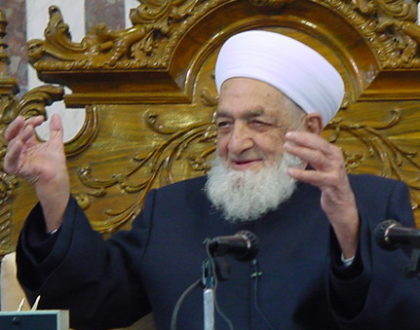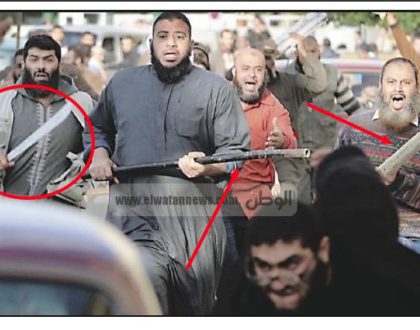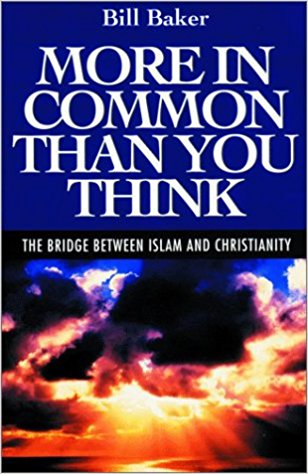My Trip to Syria Diary

June 25, 2017
By Carol Schuller Milner
Published: 2001
Dr. and Mrs. Schuller and their daughter Carol view the ancient baptismal well and its stone-made pot near John the Baptist’s tomb in the Umayyad Mosque in Damascus, Syria. December 22, 1999
I entered Syria with one mindset, I left with quite another. I entered listing her sins and the sins of her people. I left observing my own. -Carol Schuller Milner
I have just returned from the Middle East, where peace is at the forefront of global interest concerning the nations of Israel and Syria. Simultaneous with the peace negotiation meetings in Washington, I was escorting my father, Dr. Robert Schuller of the Crystal Cathedral in Garden Grove, California, to Damascus, Syria. The invitation extended to my father by Sheikh Ahmed Kuftaro, Grand Mufti of the Syrian Arab Republic, had accepted months ago.
Now, peace talks between these two religious leaders of different faiths unfolded strategically and poignantly. But, unfortunately, we brought a predominantly Western mindset into Syria that there was a nation bent on conflict, brewing war, and praying to Allah for their interests, whatever the costs. Our only challenge to this mindset had been this friendly invitation from a leader over millions of Muslims who reside in Syria, Iran, Jordan, and Lebanon. His followers revere him as the Pope is by Catholic devotees. His influence upon his nation and the global world of Islam is comparable to Pope John Paul’s in the Christian world.
We were met at the Damascus airport by the Grand Mufti’s son, Salah Kuftaro, and taken for the night to our hotel. It was en route that I was faced with the first challenge to my western mindset. Placed in an automobile alone with two Syrians, one a woman named Sanah, our female hostess, and the other a male driver, I began to recall Westerners’ media accounts of being kidnapped in the Middle East. Images of Terry Waite flashed their message of suspicion, even though I had entered the country informed that Damascus was not, as a rule, the home of an Islamic extremist.
It was ten o’clock at night, and only the shadows of the surrounding fields could be seen racing by outside the window of the black 1980-something sedan. Sanah sat attentively but silently beside me in her black skirt and jacket that obediently honored the teachings of the Qur’an, to dress modestly, not revealing any flesh but the hands and face. Her white hijab (the head covering of the Muslim female) was wrapped gracefully and intentionally about her head and neck, concealing all of her hair, so I cannot tell you whether she is a brunette or a graying black, or even a reddish auburn.
I was looking at this face when I became intensely curious to ask why she wore only a scarf – unlike some women I’d seen in the airport that exposed nothing but their eyes. They had shrouded themselves in the black garment that we would find garnishing the pages of Life Magazine. I pondered quietly: If I ask a question that upsets her cultural dignity, could my ignorance pave the way for a volatile visit? After all, I still have three days here before returning to Jordan. And by the way, are there any dirt roads intersecting this highway that might lead me away from the rest of my delegation, and should I inappropriately handle myself? After all, liberated or not, I am not at home as a western woman. I am, in light of cautious wisdom, vulnerable. I am not one to keep silent, however. Risk-taking makes me tick (though not to the level it did as a youth), and satisfying my curiosity tends to overrule my caution. So I asked, masking my consternation coyly, for an explanation of Islamic dress.
Contrary to my western suspicion, there was no offense in her response. She explained to me the reason behind the hijab. The hijab is part of modesty. Modesty is the real issue in the Qur’an. Depending on the Muslim female’s cultural upbringing, different sects, localities, or tribes help shape an individual’s modesty interpretation. The woman is to respond honestly to her convictions as a true Muslim. (Muslim means one surrendered or submitted to God.)
Although most Muslims believe the traditional Islamic dress is to wear un-transparent loose clothing and show the face and hands, some people go beyond the tradition. Of course, there are exceptions to every rule, but the Qur’an warns against extremism. Other women, however, cover themselves entirely (as I saw later in the week when an older woman passed me with even her eyes draped in black. I assume the material was thin enough to give her the vision she needed to find her way around town). Yet some other women in the new and younger generation are questioning altogether the wearing of the hijab (as the Jordanian Times reported concerning this controversial changing of the times). The heart of the action is to dress in a way that would not tempt a man.
Every congregation of all religions seems to have an unspoken dress code and belief system regarding modest and appropriate dress. If I go to Sioux County, Iowa, where my parents were reared, they will interpret modesty differently from my Orange County, California, beach-going neighbors. (I speak from the background of being raised in a Protestant Christian home with a Southern California flavor, but each of us could supply our own societal and religious norm and, if we allowed ourselves to, discover a thread of similarity in motive to the Middle East Muslim). In this willingness to understand exists the potential to promote brotherhood between Muslims and Christians and within humanity.
The next day, we would meet with the Mufti in his home to break the Islamic fast of Ramadan. The world, as I had come to know it, would change. I would look into the eyes of a man who reflected gentleness and sincerity in a way I have seldom seen in anyone. These were not the eyes of a bloodthirsty warrior. And the words that I would hear would be laced with such profound wisdom that respect would forever embed itself in my image of the true Muslim. Again, these were not words of war. And the touch of a withering aged hand was not the touch of violence. It was so soft that I wished many times over after our departure that I could feel it again.
One of Mufti’s most profound comments during our three-day visit was when he shared with us this illustration: Religion is like rain. It falls upon the people and refreshes them. But then the extremist comes along and pollutes the rain, retaking it unhealthy for all, poisoning any that would drink it. The comradery between my father and the Mufti was amazing. And the similarity in the message was stunning. I heard from the Mufti things that my father has voiced for decades. They spoke of their common ground in each a voice that is enigmatic and controversial to their spiritual colleagues. I haven’t seen any person that has NO good in him – each person has his own key – may Allah give us the divine key. (Grand Mufti Kuftaro)There is a need for humanity that is greater than meaning. It is the need for DIGNITY. (Dr. Robert Schuller)Faith must meet with reason – through understanding. (Grand Mufti Kuftaro)Arrogance exists in many. We tend to convince ourselves that we each have all of the answers. If I have all the answers, I don’t need you. I don’t need to link to my neighbor or listen to his voice. (Dr. Robert Schuller)
The twenty-first century is the century of peace. (Grand Mufti Kuftaro)
We must close the door on the dark ages of the last millennium. We must enter the new millennium with a commitment to peace. (Dr. Robert Schuller)The next day would enhance the profundity of our trip. Our delegation would be welcomed into the Abu Nour Mosque to listen to my father’s address to 15,000 Muslims. Also present would be two Orthodox Patriarchs, one high-ranking Catholic priest representing the Roman Catholic Patriarch in Rome, and the President of the Armenian Evangelical Community of Syria. It was Friday, December 17, at 11 am. (5: 00 am. EST).
The opening to the peace talks in Washington would be finished, and we would be among the Syrian people who have prayed for years, not unlike their Israeli counterparts, for peace in their land.
We would watch the beauty of two like-hearted men sitting side by side, sharing a common message of peace. We would see them clutch hands in affectionate brotherhood. We would hear murmurs of enlightenment rising from the great congregation as pleasant -surprise at the likeness between these two leaders replaced uninformed skepticism in the people. We would give and receive warm smiles and bonding grins. We would see wet emotion wiped from shrouded eyes (ours included since we also donned head coverings).
We would all chuckle with a typical response to pleasant, heartwarming jests between Easterners and Westerners. And we would hear these admonitions from my father as he delivered his forty-minute sermon in this great Muslim mosque: “God wants us to work together for peace in the next century starting today! I want to tell the world – do not think of me as a Christian, a term coined by humans. Please think of me as a follower of Jesus Christ. Forget about religion; think of us as brothers and sisters.
We all believe in “Shahadah” “Witnessing” – do this with a smile, with kindness, with love.” (The Mufti nods insincere agreement). “We cannot support aggression and hatred. We must not look back. We must look to the future! I have a dream that positive Christians and positive Muslims, and positive Jews can and will write a new history of caring and co-service. Together we will move our world, our children, and our children’s children from collision to the coalition.”- (Dr. Robert Schuller)
My father would end his message with a story of a group of Down Syndrome children. These Special Olympic competitors were lining up at the start of the 100-yard dash, each intending to be the first to cross the finish line. Bang! The signal to start pierces the air. The racers jump from their starting places and race for the finish line; suddenly, one of the racers trips, falling to his knees. Hearing his cries, his competitors stop. Not one continues the race. Instead, they turn around to share his pain and grief. Now, every racer approaches the one who has fallen in the dust. Gently, compassionately, they raise him to his feet. Then, linking arms and smiling, they all head to the finish line, crossing it together.
My father then concluded: Let us run the race of peace, with arms and hearts interlocked together. And the Mufti concurred: “We are entrusted to act upon this message and spread it to the world. We must prepare and pave the way for Christ’s coming, that humans should become brothers of each other. None of you is a believer unless he loves for another what he loves for himself. We believe that we must teach the world what Islam is. (Islam means Peace)
I am optimistic that this is heartfelt and that we will see what Dr. Schuller and I have said. We are entrusted to act upon our message and spread it to the world. The world is not a small village but one family. If peace is achieved in our hearts, with God, peace will be achieved worldwide. I pray our hopes will be fulfilled. Peace be upon you all. Praise be to God.”
The audience of 15,000, 5 thousand in the great hall and overlooking balconies, and the 10 thousand watched by closed-circuit television in overflow rooms were all deeply moved. I entered Syria with one mindset. I left with quite another. I entered, listing her sins and the sins of her people. I left observing my own. If we point out the sins of one nation, we cannot; we MUST not ignore the sins of the other nations.
Very often, our greatest adversary resides in our own camp. I am ashamed that my forefathers, the Christian Crusaders, raped and pillaged the Holy Lands. It was a devout Jew who assassinated Ithzak Rabin as he sang a song of peace. And it is a few Muslim terrorists who spread fear in the world today. All of us know that the list could go on. At one time or another, we have all desecrated our holy beliefs and creeds.
As the Mufti said, “Extremists discolor the beautiful face of Islam.” We who desire to live by a religious creed have a choice – we can use our religion to segregate or congregate our fellow humans. Murder does not begin in hand; it begins in the heart, likewise with peace.
As for the three major religions of the world: Judaism, Christianity, and Islam, we all can claim a common greeting… “Peace.” Let each of us vow afresh that our millennial resolution will be to live by this greeting and allow it to govern our hearts and actions.
And so it is with this greeting and this blessing that I conclude…
Shalom… Salam…. Peace … on Earth and goodwill to all men. Written by Carol Schuller Milner. December 1999. – Carol Schuller Milner
Recommended Posts

The Eternal Values
August 28, 2017



